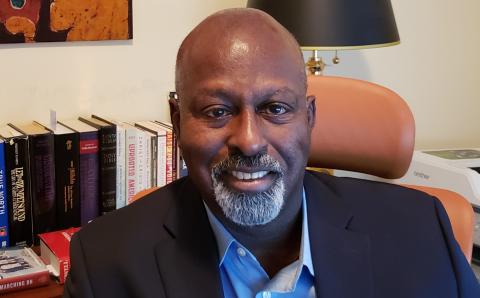“My name’s Mike, and I’m an alcoholic.” That’s how I introduce myself in meetings of Alcoholics Anonymous.
I, like most others, didn’t start attending AA meetings out of mere curiosity or boredom. I was compelled by the damage caused by my drinking habits.
When I was drinking, of course, I never considered myself to have a problem, and I certainly never considered myself to be, of all things, an “alcoholic.” You see, I didn’t drink every day. I didn't drink before or during work. I held down a professional job. I was married with two kids. I faithfully attended church. I considered myself to be a good, upstanding, and productive Christian and member of my community who just happened to enjoy tipping back a few. I mean, who other than prudish teetotalers doesn’t like to drink? I worked hard and deserved the break from life’s stress, anxiety, and worry that alcohol afforded. That’s what I thought at the time, anyway.
But my drinking was a problem. Once I started, there was really no telling how many drinks I might have. Maybe just one … but maybe 10. Maybe I’d leave the bar early or switch to water. Or maybe I’d stay until last call and switch to the hard stuff. And this habit of mine affected every aspect of my life. Being hung over, tired, and cranky made me a lesser husband, father, employee, and Christian—not to mention someone who said and did hurtful things while intoxicated.
All this came to a head one evening when I decided to dissolve my worries in a bottle at the local bar. Afterward, in my attempt to drive home, I hit a parked car and drove off the road. I was subsequently charged with and convicted of a crime. But that wasn’t the worst part. Because of my job as a local prosecutor, my selfish and irresponsible misdeeds became front-page news. And in the age of social media, it seemed as if everyone in the community not only knew what I had done, but was publicly attacking and judging me online.
I was overcome with guilt and shame. I strongly considered changing careers or moving to a different community. Everything I had worked so hard to accumulate and everything I had relied on to provide safety and security vanished before my eyes. My bank account was drained and, worse yet, my carefully cultivated reputation in the community as an upstanding Christian and family man not only vanished, but was upended as I was exposed as an irresponsible and dangerous drinker.
I won’t lie or sugarcoat the experience. This was hands down the worst and most difficult time of my life. Yet even if I had the power to go back in time, I wouldn’t change a thing. You see, I’ve come to view my failures differently. God uses failures to draw people toward him and to advance our faith and spiritual connection with him. In fact, our failures can be a necessary part of our walk with Christ. Without failure, we Christians might stagnate—or worse, regress—in spiritual maturity. Because of this, those of us who experience such profound failure need not give in to despair or hopelessness. Instead, we should view our failure as God does: as an opportunity to draw closer to him and to make our hearts a little more Christlike.
The worst experience in my life has become the best thing that ever happened to me. Sure, I no longer drink, which is a positive and tangible difference, but I used to prioritize work above all else and used alcohol to deal with the stress of life. I attended church on Sunday but “just didn't have time” for a small group, daily devotions, or prayer. I preferred to limit God to Sunday mornings, where he wouldn’t interfere with the important work I had to do throughout the week.
Then, in the span of a single night, God demonstrated to me how shortsighted and hollow my perspective had been. The image of competence and integrity I had worked so hard to project was shattered. The career I’d invested countless hours preparing for and building was suddenly in jeopardy. Everything I’d built and relied upon was in shambles—everything, that is, except for God. God, through his boundless grace, rescued my stubborn heart. A cruel or uncaring god would have allowed me to continue living my life so selfishly. But God drew me back toward him in the only way that could have worked: by allowing me to experience the natural consequences of my sinful behavior and demonstrating how my life, built upon worldly definitions of success and stability, had the structural integrity of a house built upon sand.
Though painful and unpleasant, this is exactly how God wants failure to work in our lives. Jesus tells us that to be his disciple, we must deny ourselves, take up our own cross, and lose our lives for the sake of Christ (Matt. 16:24-25). We are told to resist the temptation to love the world and conform to its patterns, which value personal accomplishment and material success above all else (Rom. 12:2; 1 John 2:15-16). From the perspective of an imperfect and selfish sinner like me, this commandment seems impossible. How can I resist the constant pressure from our world and culture to exalt myself above God? How can I place my relationship with God above my inherent desire for financial success and security, professional achievement and respect, and personal image and status?
Well, God used the only method for exposing the fool’s gold promised by this world that will work on a stubborn heart like mine: failure. Discomfort and pain cause greater change in our lives than comfort and ease. And God promises to work in all things for the good of those who love him (Rom. 8:28). Not some things, or successful things, or pleasant things, or even good things. God uses our failure, sin, and mistakes for our good as well. As James explains, our “trials of many kinds” are used by God to build within us a strong, enduring faith and to transform us into mature and complete followers of Christ (James 1:2-4). That is exactly how God used my failure. I am certainly not a finished product and never will be this side of eternity. But I’m not who I used to be either.
Failure and personal trials do, in fact, come in many different forms. They can look like a failed business, divorce, addiction, bankruptcy, a wayward child, an extramarital affair, or any number of unique circumstances. But if you find yourself having made such mistakes, please take heart. Know that God can and will use even this for your good. There is a transformative resolution to our failure and pain. There is a life and heart change that previously seemed impossible. Have faith, have patience, and trust in a God who is able to do immeasurably more than all we ask or imagine (Eph. 3:20).
About the Author
Michael Schuitema is an attorney in Petoskey, Mich., where he lives with his wife and two children. Michael graduated from Calvin University in 2004 and attends Genesis Church.







